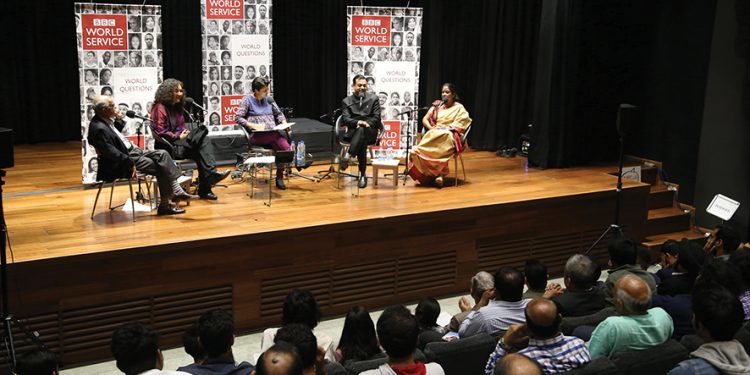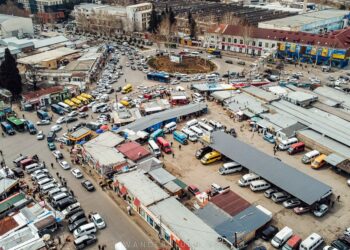BBC World Questions, the BBC World Service program that puts people and their questions at the heart of the debate, is landing in Tbilisi on Tuesday 12 September, seeking to bring together leading figures and the public to discuss the issues that matter most to the people of Georgia.
Presented by Anu Anand on location at the Liberty Theater, a panel of politicians and opinion formers will join a debate led entirely by questions from a public audience.
Critical subjects including the country’s possible accession to the European Union, relations with Russia, freedom and democracy, the economy and the environment, will all be up for discussion.
Appearing on the panel for this program will be:
• Mariam Lashkhi, MP for the governing party, Georgian Dream Party
• Tina Bokuchava, MP for the opposition party, United National Movement (UNM)
• Kornely Kakachia, Professor of Political Science, Tbilisi State University
• Levan Ghambashidze, Philosopher
“BBC World Questions travels the globe hearing about the big issues that matter most to our audiences, and it’s their opportunity to hold power to account,” says Gwenan Roberts, Commissioning Editor, BBC World Service English. “We’re excited to visit Tbilisi and look forward to an informed and lively debate!”
GEORGIA TODAY sat down with Helen Towner, Series Producer of BBC World Questions, to find out more about the upcoming event.
What prompted the BBC to come to Tbilisi to host this event?
BBC World Questions is the BBC World Service radio program that puts people and their questions at the heart of the debate. As Georgia continues its journey to join the EU, we are delighted to be hosting World Questions in Tbilisi – bringing together government and opposition politicians, as well as leading thinkers and analysts. They will be answering the questions and discussing the topics that matter most to the people of Georgia.
What are your expectations for the event?
We hope to have an open and free debate about topics that are important for the people of Georgia. These could be around membership of the EU, or relations with Russia, or the political situation in Georgia, or the environment – we let the audience decide which questions they want to put to the panel. This way we hope to let the world know what Georgians are thinking about and discussing.
Having both sides of the political spectrum on stage in Tbilisi is uncommon, particularly to answer the public’s questions. Do you think this might be a clarifying or complicating moment for each side?
It is really important in any democracy for people to be able to hear both sides of an argument or political position. We are delighted to have elected representatives from both the governing party, the Georgian Dream, and the leading opposition UNM party on our panel. This gives the public the chance to hold their elected politicians to account. It can be very empowering, and hopefully enlightening.
One of the topics is Georgia’s accession to the European Union, and both the ruling party and opposition have touted their plans as the key to achieving this goal. How much will we get to see each side’s roadmap to the EU during the event?
We expect both parties to outline their plans to achieve the goal of EU membership. We also have two political analysts on the panel who can pick that apart a bit, and give more context. It’s a complex issue. I hope we get some real clarity on this difficult issue.
Naturally, relations with Russia is a sensitive topic in a country still facing a Russian military presence in its territory. What are some things you hope the panel will address in this matter?
The topics will be determined by the audience, so we will be guided by their opinions and questions, but given events in the region, it seems very likely that Russia will come up. I hope that we will hear thoughtful opinions and suggestions on what Georgia’s position should be in relation to Russia, and we look forward to hearing our audience’s views on this as well. Maybe some Russians will attend the event in the audience – it would be really interesting to hear from them too.
How will this town hall format be different regarding questions about freedom and democracy in the country, since the questions will be coming from the public directly?
This is a chance for the people to get their questions answered by their politicians, and to become part of the debate themselves– it’s democracy in action. We usually get through six or seven questions in the course of the program, and we keep an open mind about what those issues will be. It will be exciting to see what Georgians want to discuss.
With the elections approaching next year, do you think this event will affect popular opinion for either side?
Public debate should always be informative, so we hope it may even encourage new thoughts and ideas on some level. We are also very grateful to the people of Tbilisi and our panel for giving the BBC their time and energy, and for taking part in this event, which will then be heard around the world.
* * *
BBC World Questions: Georgia is an English-language program which will be recorded for broadcast worldwide across the BBC World Service and BBC Sounds, as well as most other podcast providers. It will be recorded in English on Tuesday 12 September in front of a live audience at the Liberty Theatre, Tbilisi. We invite all audience members to attend a reception from 6.30pm to prepare questions for the debate, with the recording from 7.30pm.
Tickets to be part of the audience can be found at https://www.bbc.co.uk/showsandtours/shows/world-questions-12sep23.
Compiled by Katie Ruth Davies and Mike Godwin














